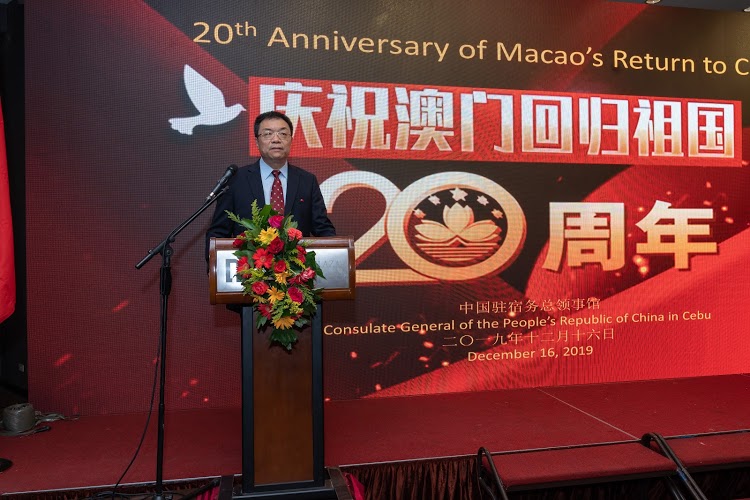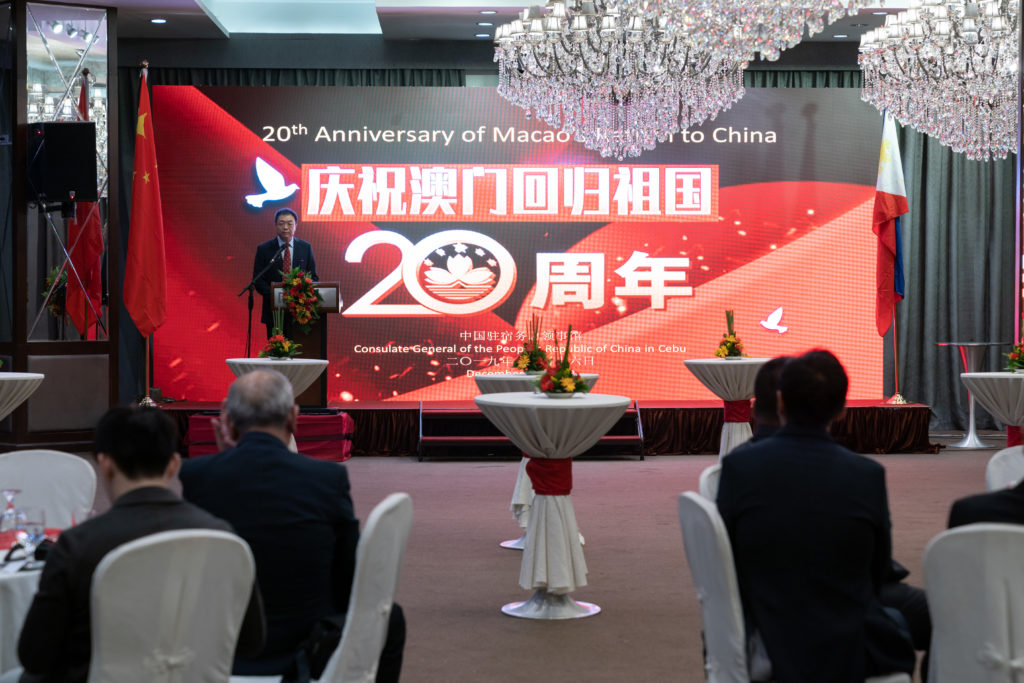‘A vibrant, stable and peaceful Macao’ 20 years since its return to China

Consul General Jia Li of the Consulate General of the People’s Republic of China in Cebu
CEBU CITY, Philippines — It was a first for the People’s Republic of China Consulate in Cebu.
It was the first time they were celebrating the anniversary of Macao’s return to China and for a good reason. It has been two decades since the erstwhile Portuguese colony was handed over to China by Portugal.
Consul General Jia Li, in a speech during the celebration held on December 16 at the Mandarin Hotel Cebu, enthused about the “tremendous development” of Macao’s economy and society in the twenty years that it has been China’s Special Administrative Region Government under the “one country, two systems” policy.
Li said the rapid economic growth of Macao has been evidenced by its gross domestic product (GDP), which grew from USD5.86 billion in 1999 to USD54.5 billion in 2018.
Here is his full speech:
“Do you know that Macau is not my real name? I have been away from you for such a long time…”This is a famous song named “the song of seven suns.” On December 20th 1999 this song was sung over the whole China. China’s national flag rose in Macao and officially ended the history of Macao being a Portuguese colony. In the past 20 years, after Macao’s return to its motherland, Macao has made tremendous development in its economy and society. A vibrant, stable and peaceful Macao is presented to the world with a new look. We are really happy and proud of this!
The Macao Special Administrative Region Government adheres to the policies of “one country, two systems,” “Macao people administering Macao” and a high degree of autonomy.
“One Country, Two Systems” was first proposed by Mr. Deng Xiaoping. It is a basic policy of the Chinese Government established according to the Constitution of China and implemented through the Basic Law of Macao Special Administrative Government. “One Country” means Macao is part of China, and China has sovereignty over Macao. “One Country” is the foundation. It is the precondition and basis for “Two Systems.” “Two Systems” is subordinate to and derived from “One Country.” Without “One Country,” “Two Systems” will no longer exist.
As long as “One Country” is upheld, the Chinese Government respects the differences between the two systems, and supports “Macao people administering Macao” and a high degree of autonomy. This position has been clear and consistent.
In the 20 years since Macao’s return to the motherland, the practice of “one country, two systems” has had fruitful achievements. First, the policies have been widely accepted and implemented in Macao society. The right to governance is effectively exercised, and the high degree of autonomy enjoyed by the Special Administrative Region is fully guaranteed.
Second, Macao’s exchanges and cooperation with the motherland are getting closer and closer. It continues to make unique contributions to the country’s reform and opening up, and shares the opportunities and achievements brought about by the modernization of the motherland. In the past 20 years, the Mainland and Macao have formed a mutually beneficial and inseparable economic and trade pattern. The Mainland is Macao’s largest trading partner, and Macao is also an important channel for the mainland to use foreign capital and export. Before the return, Macao’s economic environment was harsh, with negative growth for four years.
After the return, Macao’s economy has grown rapidly. The GDP has increased from 5.86 billion US dollars in 1999 to 54.5 billion US dollars in 2018. The per capita GDP has increased from 14,000 US dollars to 82,600 US dollars, which ranks second in the world. Macao’s unemployment rate dropped from 6.4% in 1999 to 1.8% in 2018, and it has basically achieved full employment. Macao residents have an average life expectancy of 85 years, which is among the highest in the world. Since 2008, cash sharing has been performed with local residents. In 2019, the cash sharing quota for Macao permanent residents increased from 9,000 patacas to 10,000 patacas.
Since the return, major national policies such as the “Closer Economic Partnership Arrangement (CEPA),” tourism promotion, Pan-Pearl River Delta Regional Cooperation, and development plan for the “Guangdong-Hong Kong-Macao Greater Bay Area” have been issued.
“Backed by the motherland and facing the world,” Macao has ushered in development opportunities again and again. Major infrastructure projects such as the Hong Kong-Zhuhai-Macao Bridge, the Guangdong-Macao New Corridor, and the Macao Airport Reclamation Project have been completed and put into use, setting up a more robust and reliable platform for Macao’s development. Macao is one of the four major cities in the Greater Bay Area, and is tied with Hong Kong, Guangzhou, and Shenzhen as the core engine of regional development. The development guideline of “one center, one platform, and one base” of Macao has been included in the country’s major development strategy.
These achievements fully prove that the “One Country, Two Systems” policy has strong vitality. The Macao people who have grasped their own destiny are fully able to unite and build their hometown under the guidance of the “One Country, Two Systems”, “Macao People Administering Macao” and a high degree of autonomy. Firm adherence to this basic national policy is an inevitable requirement for the long-term prosperity and stability of Macao, and an important part of the realization of the Chinese dream of the great rejuvenation of the Chinese nation. It is consistent with the overall and long-term interests of Macao and the whole nation, and the interests of foreign investors.
Disclaimer: The comments uploaded on this site do not necessarily represent or reflect the views of management and owner of Cebudailynews. We reserve the right to exclude comments that we deem to be inconsistent with our editorial standards.

